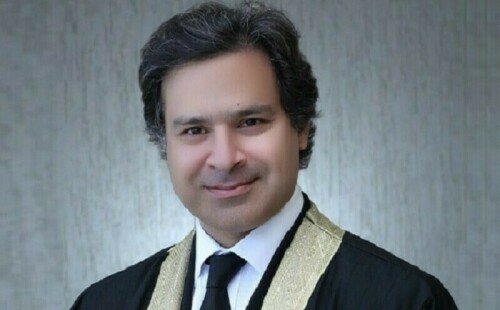WASHINGTON, April 29: President George Bush said on Thursday that US-led forces were making “really good progress” in Iraq, but acknowledged they were still facing a stubborn resistance run by “hard-nosed killers”. In a prime-time news conference, Mr Bush also said Iraqi security forces were performing “much better” but again refused to speculate on a timetable for the withdrawal of American troops.
Mr Bush’s upbeat comments came two days after Gen Richard Myers, chairman of the Joint Chiefs of Staff, conceded that the resistance was as strong as a year ago even if US forces were winning the war.
“I believe we are making good progress in Iraq because the Iraqi people are beginning to see the benefits of a free society,” the president told reporters at the White House.
“Nevertheless, there are still some in Iraq who are not happy with democracy. They want to go back to the old days of tyranny and darkness, torture chambers and mass graves. ... They are hard-nosed killers.”
The president reported headway in recruiting, equipping and organizing Iraqi forces to take over the fight against the guerillas.
“The Iraqi military is being trained by our military, and they’re performing much better than the past,” Mr Bush said.
“The more secure Iraq becomes, as a result of the hard work of Iraqi security forces, the more confident the people will have in the process and the more isolated the terrorist will become,” Mr Bush said.
But he would not be drawn into saying when he might be able to start pulling out US troops, whose number he said had been cut back from 160,000 deployed during the landmark Jan 30 elections to 139,000.
“I don’t think it is wise for me to set out a timetable. All that will do is cause an enemy to adjust. My answer is as soon as possible. And ‘as soon as possible’ depends upon the Iraqis being able to fight and do the job.”
The president also hailed the formation of a new interim government in Iraq after a protracted round of political horse-trading since the elections.
He said he spoke on Thursday to the new Prime Minister, Ibrahim Jaafari, and invited him to visit the United States. “I hope he comes soon,” Mr Bush said.
The president said he had urged Ibrahim Jaafari to reach out to disaffected groups in the country and to stick to the Aug 15 deadline for drafting a new Iraqi constitution.
One area that needed more work, Mr Bush said, was in firming up command structures and civilian control of the military after the formation of Iraq’s first democratically elected government in 50 years.
“One of the real dangers is that as politics takes hold in Iraq, whether or not the civilian government will keep intact the military structure that we’re now helping them develop,” Mr Bush said.
“And our message throughout government to the Iraqis is, ‘keep stability; don’t disrupt the training that has gone on — don’t politicize your military’; in other words, have them there to help secure the people.”
Mr Bush cautioned that it was no easy task to make the transition to democracy.
“We didn’t pass sovereignty but about 10 months ago, and since that time a lot of progress has been made and we’ll continue to make progress for the good of the region and for the good of our country.”
NORTH KOREA: President Bush vigorously defended the six-nation talks grouping the two Koreas, Russia, Japan, the United States and China and dismissed the approach taken by his predecessor, Bill Clinton, saying: “It didn’t work.”
When North Korea “would make a move that would scare people, everybody would say, ‘America, go fix it.’ I felt it didn’t work,” said the president.
Mr Bush, who often promised before the November elections never to give other countries a veto over US foreign policy, said Washington would not seek UN sanctions against North Korea unless its partners in the talks agreed.
“Obviously that’s going to require, you know, the parties agreeing,” he said hours after a senior US defense official said Pyongyang was now able to mount a nuclear warhead on missiles that could reach Japan or the United States.
Asked how long he was prepared to stand by the six-party talks in light of that development, Bush replied: “How far we let it go on is dependent upon our consensus amongst ourselves.”
Pressed on whether he was ruling out diplomatic or military consequences absent such a consensus, Mr Bush replied: “I was speaking about diplomatically ... like I’ve said before, all options, of course, are on the table.”
UN ENVOY: The president also made an impassioned defense of his embattled nominee to be ambassador to the United Nations, John Bolton, saying: “John Bolton is a blunt guy. Sometimes people say I’m little too blunt.
“The UN needs reform. If you’re interested in reforming the UN like I’m interested in reforming the UN, it makes sense to put somebody who’s skilled and who’s not afraid to speak his mind at the United Nations,” he said.
The Senate Foreign Relations Committee has put off until May 12 a vote on Mr Bolton, who has been accused of being abusive towards subordinates and of improperly pressuring intelligence analysts to fit his hardline views.
Mr Bush also downplayed differences with Russia over Iran, saying he was sure President Vladimir Putin understood Tehran could not be trusted with nuclear weapons, despite Moscow’s aid to the Iranian nuclear program.—AFP














































Dear visitor, the comments section is undergoing an overhaul and will return soon.